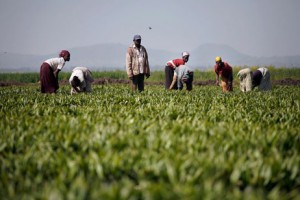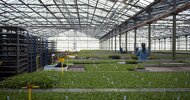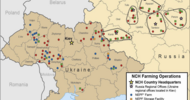Outsourced African farming threatens to alienate locals
Gavin du Venage
Last Updated: Dec 20, 2010
It is ironic that some farms in Ethiopia produce food for other countries when it needs more than $116 million in food aid itself.
Jose Cendon / Bloomberg
* next photo
* previous photo
* next photo
* previous photo
Ghana and Qatar's announcement that they will jointly farm 50,000 hectares of land is the latest in a sweeping, but controversial, trend rolling across Africa. Cash-rich countries are securing land in poorer states, which they hope will provide them with food security.
African countries need investment. And for commodity consumers such as the Gulf states, who have money to spend but little arable land, it makes sense to outsource food production.
But critics warn that in the rush to secure food for themselves, investors and African governments risk alienating large sectors of the populations, for whom land ownership is an ongoing, emotional issue.
Last year, Marc Ravalomanana, the president of Madagascar, was kicked out of office in a coup, following a mass uprising that was inspired in part by the island country's decision to make half its farmland available to Daiwoo, a South Korean company.
Zimbabwe, once Africa's breadbasket, began a disastrous agricultural and economic reform process 10 year ago in response to widespread discontent to the enduring dominance of its agricultural sector by a few thousand white commercial farmers.
For investors, the issue of land sensitivity may not always be apparent. Foreign multinationals have a long history of farming anything from cash crops to staple foods in Africa. But the scale of the new deals is something new. And the buyers are not private companies, but governments.
Not since Belgium's King Leopold turned the Congo into his personal market-garden has so much land been allocated to offshore nations.
China will begin farming 2.8 million hectares in the Congo, according to The Economist. It hopes to add another 2 million hectares from Zambia to its portfolio.
Saudi Arabia has invested US$100 million (Dh367.3m) in Ethiopia over the past year to farm food for its own growing population, but the east African country has needed more than $116m in food aid in recent months in response to a growing famine in the northern parts of the country.
On the face of it, both consumer nations and African states should benefit from co-operation. Gulf states in particular were shaken by the food inflation crisis of 2008. Traditional suppliers of staples such as Egypt and India banned exports of rice and wheat, exposing the reliance of Gulf countries on foreign suppliers.
Acquiring land, therefore, appeared to offer a solution. At the same time, Africa has lagged the world in food production. Archaic farming methods and lack of investment mean peasants today till the land using techniques used by their forefathers.
One in three Africans is malnourished, according to the UN, despite $3 billion in food aid for the continent annually, and $33bn in food imports.
As a result, sub-Saharan countries are actively looking for help in developing their farmland. Mozambique has begun the wholesale importation of white South African farmers. It has already settled about 800 and plans to bring in many more.
"We expect that in the Gaza province (in Mozambique), another 600 farmers would establish themselves," says Theo de Jager, the president of Agriculture South Africa. "The farmers who are there are mostly medium-scale farmers and the others would be large-scale farmers."
Most of Zimbabwe's displaced white farmers too have found a welcome reception for their skills in Zambia, Tanzania, the Congo and elsewhere.
But investors need to keep in mind that the continent is still emerging from the shadow of foreign exploitation, and as a result, any large-scale land allocation will be a highly sensitive issue.
Because this is new territory, for investors and African countries alike, analysts fear that too little attention is being paid to small farmers, who are often already working land that is being allocated to overseas investors.
In this lie the seeds of discontent, easily exploited by opposition parties and revolutionary groups, of which Africa has no shortage. Food security for investors will become a reality only if those laying down the cash can convince local communities, and not just their leaders, that they come with good intentions.
The National (UAE) | Dec 20, 2010
Gavin du Venage
Ghana and Qatar's announcement that they will jointly farm 50,000 hectares of land is the latest in a sweeping, but controversial, trend rolling across Africa. Cash-rich countries are securing land in poorer states, which they hope will provide them with food security.
African countries need investment. And for commodity consumers such as the Gulf states, who have money to spend but little arable land, it makes sense to outsource food production.
But critics warn that in the rush to secure food for themselves, investors and African governments risk alienating large sectors of the populations, for whom land ownership is an ongoing, emotional issue.
Last year, Marc Ravalomanana, the president of Madagascar, was kicked out of office in a coup, following a mass uprising that was inspired in part by the island country's decision to make half its farmland available to Daiwoo, a South Korean company.
Zimbabwe, once Africa's breadbasket, began a disastrous agricultural and economic reform process 10 year ago in response to widespread discontent to the enduring dominance of its agricultural sector by a few thousand white commercial farmers.
For investors, the issue of land sensitivity may not always be apparent. Foreign multinationals have a long history of farming anything from cash crops to staple foods in Africa. But the scale of the new deals is something new. And the buyers are not private companies, but governments.
Not since Belgium's King Leopold turned the Congo into his personal market-garden has so much land been allocated to offshore nations.
China will begin farming 2.8 million hectares in the Congo, according to The Economist. It hopes to add another 2 million hectares from Zambia to its portfolio.
Saudi Arabia has invested US$100 million (Dh367.3m) in Ethiopia over the past year to farm food for its own growing population, but the east African country has needed more than $116m in food aid in recent months in response to a growing famine in the northern parts of the country.
On the face of it, both consumer nations and African states should benefit from co-operation. Gulf states in particular were shaken by the food inflation crisis of 2008. Traditional suppliers of staples such as Egypt and India banned exports of rice and wheat, exposing the reliance of Gulf countries on foreign suppliers.
Acquiring land, therefore, appeared to offer a solution. At the same time, Africa has lagged the world in food production. Archaic farming methods and lack of investment mean peasants today till the land using techniques used by their forefathers.
One in three Africans is malnourished, according to the UN, despite $3 billion in food aid for the continent annually, and $33bn in food imports.
As a result, sub-Saharan countries are actively looking for help in developing their farmland. Mozambique has begun the wholesale importation of white South African farmers. It has already settled about 800 and plans to bring in many more.
"We expect that in the Gaza province (in Mozambique), another 600 farmers would establish themselves," says Theo de Jager, the president of Agriculture South Africa. "The farmers who are there are mostly medium-scale farmers and the others would be large-scale farmers."
Most of Zimbabwe's displaced white farmers too have found a welcome reception for their skills in Zambia, Tanzania, the Congo and elsewhere.
But investors need to keep in mind that the continent is still emerging from the shadow of foreign exploitation, and as a result, any large-scale land allocation will be a highly sensitive issue.
Because this is new territory, for investors and African countries alike, analysts fear that too little attention is being paid to small farmers, who are often already working land that is being allocated to overseas investors.
In this lie the seeds of discontent, easily exploited by opposition parties and revolutionary groups, of which Africa has no shortage. Food security for investors will become a reality only if those laying down the cash can convince local communities, and not just their leaders, that they come with good intentions.













